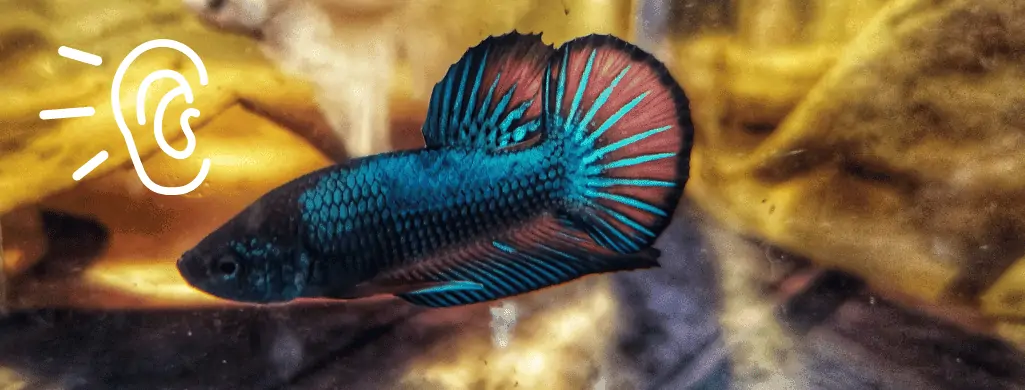Do you ever sing your fish a lullaby or talk out loud to them while you’re getting ready for school or work?
You have to wonder how much they hear and understand.
Are they judging your vocals or soothed by your voice? Can betta fish hear you at all?
Betta fish do not have visible ears as mammals do. However, they can hear via two holes in the sides of their head. They may even learn to recognize and react to certain sounds, an important skill for keeping them safe from predators.

Table of Contents
Do Betta Fish Have Good Hearing?
It isn’t like we can put headphones on a betta and administer a hearing test. (What an adorable image, though, right?)
But we do know they aren’t hearing in the same way humans hear.
This is partly because the structure of fish ears is starkly different from the structure of human ears.
For starters, our ears stick out from the sides of our heads and have a complex physical build to help us perceive, direct, and control sound as we hear them.
Betta fish don’t have ears protruding from their heads. Instead, they just have two holes on either side where sound is processed.
Of course, there are inner hearing structures for helping them understand sounds.
Another obstacle for them is the fact they’re underwater.
Have you ever gone swimming or scuba diving underwater? Or have you laid your head back in a relaxing bath and let yourself ignore everything?
One of the reasons this is so soothing is because of the utter lack of noise. Voices sound distant and garbled swimming in a community pool.
In the bathtub, music from your phone on the counter becomes so suppressed that it’s almost impossible to determine which song is playing.
Sound travels differently when water gets involved. Not to mention, glass separates you from whoever is in your aquarium.
We cannot know exactly what or how much your betta is hearing when you speak to them. But they definitely do hear you.
How Do Betta Ears Work?
We have established they don’t have the same ears as us. But how does your betta actually process sound?
The truth is, the inner ear of a betta is not so different from ours.
They do not have the exact same bones (the hammer, anvil, and stirrup) in their heads.
But they do have hearing structures designed to serve the same purpose and break down incoming sound waves.
Frequencies must travel through water before reaching your betta’s inner ear, where they are processed.
The frequencies cause one part of the inner ear to vibrate, as they do in human ears.
These vibrations are easier for the brain to interpret. (Yes, betta fish have brains!)
A lot of betta fish behavior is explained by their stance as either predator or prey.
Their brains categorize sounds as either dangerous or non-dangerous. Our brains work in much the same way!
The difference is we learn to comprehend language and use our voices to replicate sounds.
Your beloved fish does not have the ability to understand such a wide range of sounds. And they certainly do not know how to produce those sounds.
Do Betta Fish Recognize Your Voice?
Your betta fish hears you when you speak. They are not exactly proficient English speakers, though, so don’t expect soliloquies in return.
They also do not have super hearing.
Between the water, the aquarium glass, and any background noise from the tank or your home, your fish will sometimes struggle to make out your voice.
Despite being highly intelligent fish, they do not learn to understand everything we say in human languages.
In fact, they don’t even learn to recognize their own names like dogs, cats, and other pets do.
No fish has incredible hearing abilities to catch all those unique sounds and differentiate between them.
There is no guarantee your betta will come to recognize your voice. But by being around and speaking to them often, you raise the chances of their getting to know you.
Do Betta Fish Like Music?
When you find out your fish can hear, it’s pretty instinctual to want to share your favorite sounds with them.
My pet rabbit has heard every song by my favorite band, so I know the feeling!
In truth, fish enjoy some music. The thing is, loud sounds are likely to startle them.
So if you’re a big fan of The Offspring, start small and don’t leave the music on for too long.
See how things look in the aquarium when you have music on. Do your fish hide when they hear it, or are they as active as usual?
Classical music is popular if you want to keep it on constantly.
Fish generally do very well with it. In fact, it’s great stimulation for them!
Before you leave them with the music playing for hours at a time, though, take some time to observe. Even with classical, some fish just don’t like the constant noise.
Remember, loud music is stimulating to fish in more ways than one.
Not only do they hear it, but they feel it as well!
The vibrations it makes in the water are overwhelming sometimes, especially to smaller fish species like the betta.
It helps to keep the music-playing device on a different surface than the fish tank.
Don’t start off with music containing a lot of heavy bass either.
There is no way to predict exactly how your pets will react to different kinds of sounds.
This doesn’t mean we don’t let them experience it. It just means you must be vigilant and ensure that none of your fish are getting too stressed out.
Teaching Tricks Without Relying on Sound
Your betta fish does hear your voice and may learn to recognize a few words. But they won’t be able to use regular noise to learn a trick or skill.
This means some of the training techniques we often use for dogs, cats, and other mammals will not work on your pet fish.
Basic tricks like jumping or flaring on command are still teachable, though.
We talked earlier about how bettas sometimes recognize their owners by sight.
Visual commands are one good tool for teaching tricks to a pet betta.
For example, let’s say you want to teach your betta to jump.
You are not going to speak the word “jump” or make a hand motion. Both these things would be too subtle for your pet betta to understand and respond to.
Instead, you are going to work with your betta’s instincts.
Your fish wants food and is good at recognizing a treat or food flake when they see it. So use food to teach this trick.
By holding a small piece of food in plain sight just above the water, you will encourage your betta to jump up and retrieve it.
They won’t memorize visual or verbal commands the way a dog can.
But they will eventually make the association between food and jumping.
Then they will be able to perform the trick when you hold a finger above the tank.
Best Sounds for Betta Fish
The best way to keep your betta feeling safe is to keep background noise calm.
Even if they don’t hear it very well, a loud or sudden sound will always be distressing to them.
Play low-frequency music and expose them to other calming noises.
Don’t make a habit of raising your voice around them.
You don’t want them to associate your presence with scary and chaotic noises.
They do not comprehend specific words or syllables. But they do notice when something especially loud and dangerous is going on.
This is when they are likely to hide, swim more quickly, and start to feel stressed.
Remember, the hearing capabilities of betta fish exist primarily to protect them!
Spending quality time with your betta to sing for them and narrate everything you do may sound weird to others.
But it’s actually a great way to provide them with stimulation.
Not to mention, your pet fish are much more likely to get better at recognizing safe sounds if they hear them often.
Going Easy on Your Betta’s Ears
Betta fish do not have the same ear structure as people do. But they do have an inner hearing structure for processing sounds as they travel through water.
It’s not easy for them to recognize specific sounds like their own name or commands you might give them.
Instead, betta fish are better at figuring out if a sound is dangerous or safe.
This is why getting them used to your voice and presence is important.
Whether you sing or talk to them while changing water, just know they do hear you!


